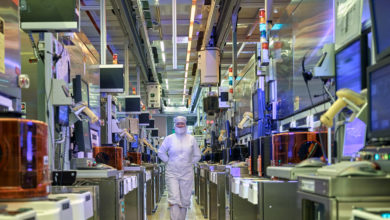The Chinese government has announced a $586 billion economic stimulus package to help bolster the country’s economy in face of the global economic crisis.
|
A statement published by the Chinese news agency Xinhua Nov. 9 noted that the program will “will loosen credit conditions, cut taxes and embark on a massive infrastructure spending program in a wide-ranging effort to offset adverse global economic conditions by boosting domestic demand.”
The state-controlled China Construction Bank has announced it will lend $4 to $7 billion before the end of the year, in addition to its original full-year quota, to support the central government’s efforts to stimulate economic growth. U.S. private banks, in contrast, have used hundreds of billions in “equity injections” by the U.S. Treasury and loans from the Federal Reserve to hoard money capital and reserves and acquire other banks instead of helping ease the credit crisis with expanded lending.
The initiative will bring major funding to 10 areas of concern, including low-income housing, rural infrastructure, water and electrical projects, and environmental improvements among others. Transportation projects will include construction of new railways, roads and airports.
It is particularly striking to note that the funding, which was announced by China’s State Council, will bring additional relief to people suffering as a result of several natural disasters, including the major earthquake that hit Sichuan province May 12.
Contrast this with the U.S. government’s lackadaisical response to communities hit hard by hurricane Katrina. It claimed there was no money then to evacuate residents or rebuild devastated communities. But when the bankers faced a crisis, the politicians quickly conjured up the necessary resources to bail them out at the expense of taxpayers. If it did not happen sooner, it was only because of the mass outrage sparked by plunder of public money, which led many in Congress to vote against the bailout at first.
Those representatives, who serve the interests of the capitalists, quickly fell into line and passed the grand theft bailout. In doing so, they gave Treasury Secretary Henry Paulson, who had received hundreds of millions of dollars as CEO of Goldman Sachs, virtual dictatorial power over how the $700 billion in taxpayers’ money would be spent.
The level of corporate arrogance was made abundantly clear Sept. 22, when executives at AIG spent $440,000 on a luxury retreat. Just one week before that, the government had given the giant insurance company an $85 billion emergency bailout loan.
The phenomenal growth rate of the Chinese economy has been slowing in the past year. In October, China reported that its gross domestic product grew at a 9 percent annual rate in the third quarter. The growth was less than had been expected and marked the fifth straight quarter in which growth had slowed.
In contrast, economic growth for the entire world is expected to decline to a 2.2 percent growth rate in 2009, according to researchers at the International Monetary Fund, down from a 3.8 percent growth rate in 2008. China’s annual growth rate had averaged 10.6 percent over the last five years.
China has instituted a number of capitalist reforms over the last three decades, and its economic stimulus plan is not indifferent to the interests of private capital. However, the social considerations of the Chinese Communist Party’s economic stimulus plan reveal priorities that are qualitatively different from that of the U.S. capitalist government.
As the China Daily noted, “China’s aim is not just to spend its way out of a recession.” Many aspects of the plan are tailored to improve the quality of people’s life, including better housing, better schools, better health care and a better environment, and to achieve sustainable development. Their implementation will help social programs and community interests flourish.”



